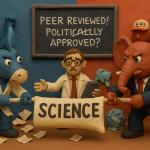Thus far, 2025 has brought us some thirty thousand or more flu deaths, almost 900
Policy & Ethics
By any measure, the Food and Drug Administration (FDA) is one of the most critical and ubiquitous institutions in American public life.
Join Cameron English and Dr. Chuck Dinerstein on Episode 113 of the Science Dispatch podcast as they discuss:
“I want to pause here and talk about this notion of consensus and the rise of what has been called consensus science.
The academy has been in an uproar since Donald Trump began his second term as president in January.
In the U.S., the mainstream medical (and legal) community strongly supports gender-affirming care for young people.
If you haven’t heard much about "Dr. Oz's Very Bad Day" in 2014, you’re not alone. Dr.
Musk’s Neuralink is hardly the first company to use BCI technology. So, why is it now making headlines?
Established by Congress in 1997, MedPac, the Medicare Payment Advisory Commission, is a 17-member group advising the Center for Medicare and Medicaid Services on pricing of healthcare services.












